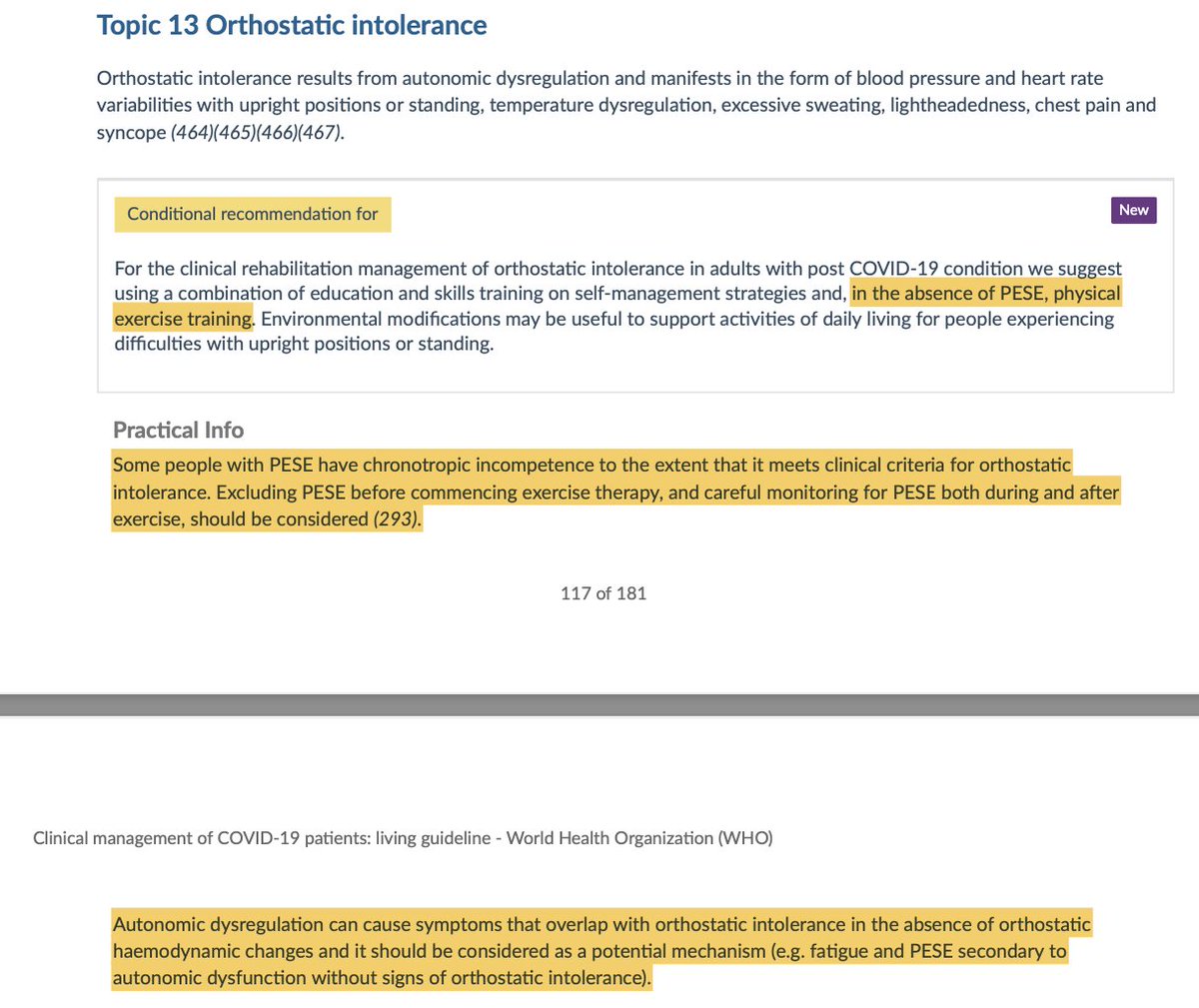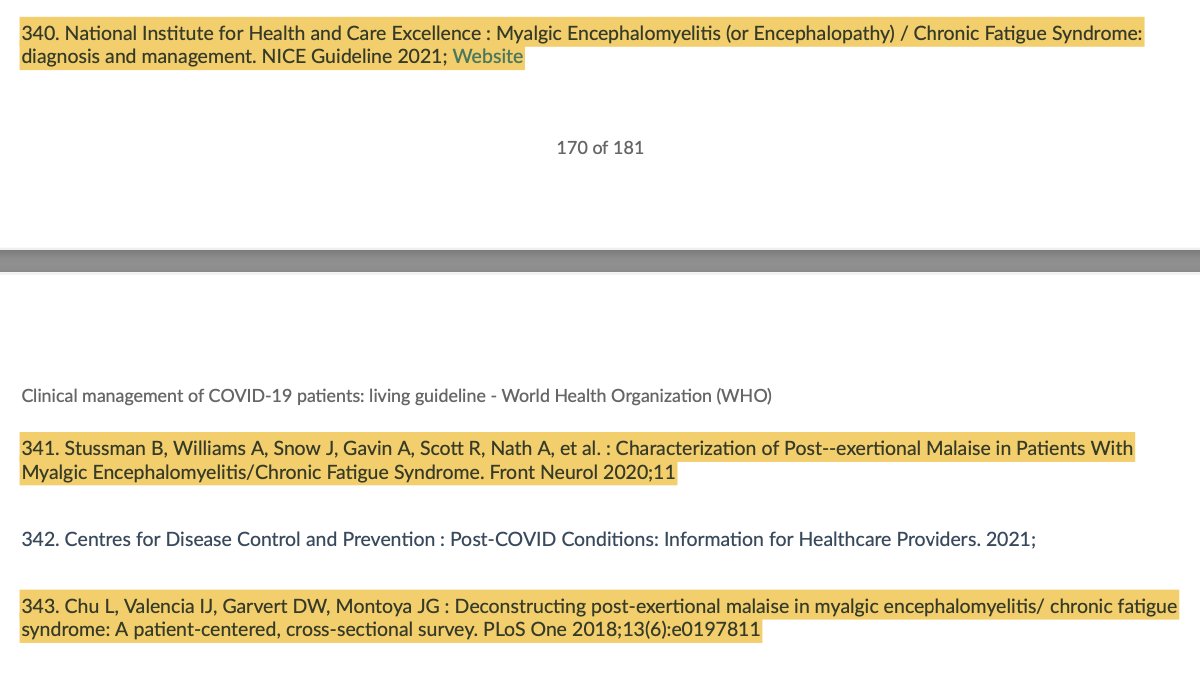
Finally! New @WHO guideline specifies: NO EXERCISE THERAPY for #PostCovid patients if they suffer from POST-EXERTIONAL SYMPTOM EXACERBATION.
Hope this will protect more patients from becoming bedbound by wrongly applied #rehab measures like GET
Please RT
For more info see 🧵⬇️
Hope this will protect more patients from becoming bedbound by wrongly applied #rehab measures like GET
Please RT
For more info see 🧵⬇️
The new recommendations can be found in the WHO “Living Guideline for the clinical management of Covid-19” (publ. 09/15/22).
Link to the original document as PDF or via online platform here:
who.int/publications/i…
Excerpts in the thread (PEM/PESE mentions and highlights)
2/
Link to the original document as PDF or via online platform here:
who.int/publications/i…
Excerpts in the thread (PEM/PESE mentions and highlights)
2/
If I’m not mistaken, #PEM/#PESE were not even mentioned in the last version (06/22). Now many of the changes relate to #PESE (mentioned in 7 out of 16 new recommendations!).
Summary of the new recommendations below (#PESE mentions highlighted).
3/


Summary of the new recommendations below (#PESE mentions highlighted).
3/



The problem of post-exertional symptom exacerbation (=PESE) is explicitly and frequently mentioned throughout the document.
There is a separate subchapter on “Rehabilitation with post Covid-19 condition” (pg. 103f. in the PDF)
4/
There is a separate subchapter on “Rehabilitation with post Covid-19 condition” (pg. 103f. in the PDF)
4/

The subchapter on #PostCovidRehabilitation includes (at least) two detailed sections with great relevance for #LongCovid sufferers. One topic is on “Red flags for safe rehabilitation” (pg. 105f.).
5/


5/



Another topic addresses “Post-exertional symptom exacerbation” in detail. PESE is defined as “the worsening of symptoms that can follow minimal cognitive, physical, emotional, or social activity, or activity that could previously be tolerated” (pg. 110f.).
Thank you @WHO 🙏
6/


Thank you @WHO 🙏
6/



This section highlights a critical aspect: As patients are often unaware of suffering from #PESE, medical professionals must always take the possibility of #PESE into account and carefully assess LC patients for #PESE before starting any physical exercise therapy (pg. 110).
7/
7/

Throughout the document, when "physical exercise" is mentioned, the warning is added that it may only be done “in the absence of #PESE” and that PESE must be excluded beforehand. PESE is very present as a critical factor to consider. Some examples below (pg. 111, 114).
8/


8/



Another very important message: While “there is moderate certainty for the management of fatigue with exercise therapy in other long-term conditions, (…) there is uncertainty how this evidence applies to people experiencing post-exertional symptom exacerbation” (pg. 115).
9/
9/

The document also has a separate section on orthostatic intolerance and mentions autonomic dysregulation (pg. 117f.).
10/
10/

The fact that the @WHO so strongly empathizes activity intolerance in many post covid patients raises hope that this knowledge will soon reach all levels of health care providers. Way too many patients have been severely disabled by falsely applied activation therapies.
💔
11/
💔
11/
Until then maybe patients could use some of these pages from the WHO guideline when needed in discussions with MDs or in rehab. Hopefully a WHO recommendation should have sufficient credibility.
#PESE is mentioned on 15 (!) pages in the WHO guideline.
12/
#PESE is mentioned on 15 (!) pages in the WHO guideline.
12/
Last but not least: The document references several studies on #MECFS. I don’t know them, but it does give some hope that the WHO is at least aware of and working with ME/CFS-related studies. Hopefully a good sign for the long over-due research and medical help for #pwME.
13/



13/




As I am a small account, please RT broadly. Awareness of the danger of physical exertion if suffering from #PESE can help protect people from becoming severely disabled. Too many already💔 #LC and #MECFS can happen to all of us. Therefore: please spread the word! Thank you 🙏
//
//
@longcovideurope @patientled @microbeminded2 @darrenabrown @exceedhergrasp1 @organichemusic @trishgreenhalgh @Dan_Wyke @KunstJonas @DafoeWhitney @JanetDafoe @Dakota_150 @TomKindlon @doctorasadkhan #NEISvoid @LongCovidFam @LongCovidScot @research_long @LongCovidFund
@LongCOVIDPhysio @LongCOVIDNatl @Dr_M_Guthridge @LC_UK_Action @LongCovidUK @LongCovidUS @Longcovidhelp @LCNMUK @LongCovidNL @LongCovidNYC @LongCovidNZ @LongCovidNews @longcovidfdn @MBVanElzakker @AHinkle628 @itosettiMD_MBA @PutrinoLab @VirusesImmunity @erictopol @GinaAssaf
@LisaAMcCorkell @ahandvanish @herlifeinpixels @AthenaAkrami @itsbodypolitic @loscharlos @gezmedinger @AMannanBaig @CortJohnson @elisaperego78 @MEActNet @MEActNOW @MEActNetUK @meactionga @MEActMaryland @MEAssociation @PlzSolveCFS @resiapretorius @LongCovidCH @long_covid
@LongCovidSOS @longcovidspain @jenbrea @TreatLongCovid @julierehmeyer @ME_Vereniging @DrMaureenHanson @drclairetaylor @Sunny_Rae1 @EurekaHealthApp @Be_Kinderr @keithgeraghty @vijayiyer312 @cazd45 @davidtuller1 @MVGutierrezMD @BhupeshPrusty @LongCovidGroup @LongCOVIDGuide
• • •
Missing some Tweet in this thread? You can try to
force a refresh







